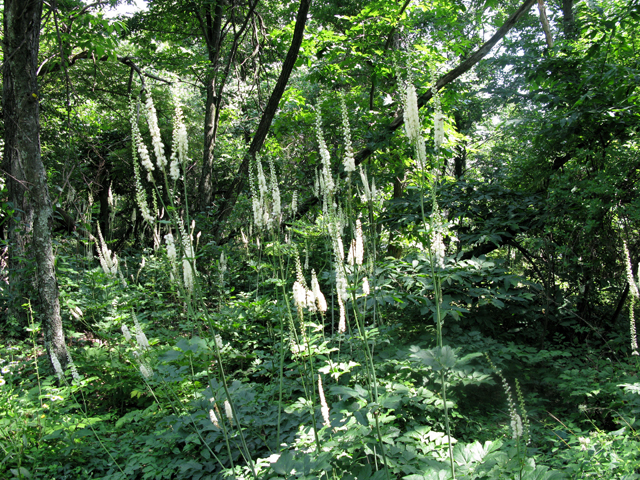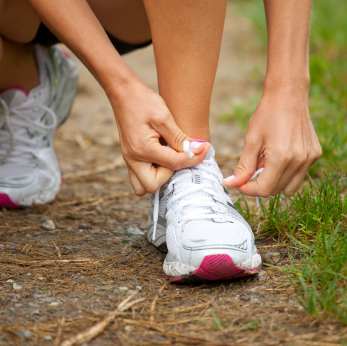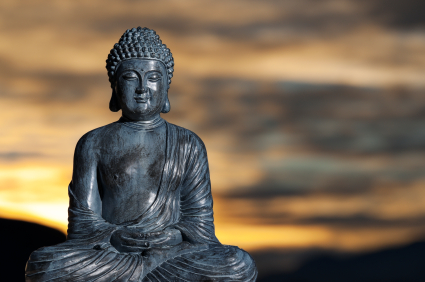Black cohosh: dose matters
[Image: Thomas L. Muller, The Lady Bird Johnson Wildflower Digital Image Library at the University of Texas, Austin]
I have written frequently about black cohosh on Flashfree. And consistently, the relationship between black cohosh and a decline in certain symptoms has been demonstrated in clinical trials. However, here’s the rub: both formulation and dose appears to matter.
About a year ago, findings from scientifically sound (i.e. randomized, controlled, double-blind) trial demonstrated that taking the higher dose formulation of a black cohosh extract (Ze 450) yielded greater benefits in terms of symptoms severity and quality of life in A group of menopausal women. However, what happens over the long term? Do symptoms reappear or do improvements continue? And, is it really true that dose matters?
In a follow up study, researchers selected over four hundred women with menopausal complaints who were seeing about 100 physicians in general and specialty practices. Initially, these women were treated with a high dose of black cohosh root extract (13 mg) for 3 months and either continued with that dosing for another 6 months or were told by their physician to take a smaller, 6.5 mg dose for 6 months. Overall, a majority of women had moderately severe symptoms (most commonly hot flashes, night sweats, insomnia, anxiety and depression) and about two thirds had received previous treatment for them. Importantly, none of the women taking concurrent hormone therapy were included in the final evaluation.
Over the course of 9 months, black cohosh extract significantly decreased symptom severity by roughly 56% as measured by a scientific menopause scale. More improvements continued to be seen over time, regardless of dose. However, almost 90% of women responded to the high dose extract versus 78% of women responding to the low dose; this suggests that greater benefit can be realized among greater numbers of women with a higher dose. Indeed, women taking the high dose, experienced improved relief of a variety of symptoms (e.g. hot flashes, sweating, dizziness, joint and muscle pain, etc) over time. Both doses were also well tolerated in about 95% of women, although the higher dose was associated with some gastro issues in 12 women).
Another interesting point about this study was that it was conducted in what researchers refer to an ambulatory setting, meaning that it was not a controlled trial situation. Because similar results were observed under controlled conditions, conducting the extension under a more realistic environment allowed them to draw the conclusion that the findings reflected those that would likely be seen in the general population.
The black cohosh extract used in these studies is called Cimefemin® uno (6.5 mg) and Cimefemin® forte (13 mg) and is not available in the States, at least not yet. Meanwhile, if you wish to try black cohosh, read through the archives, speak to your practitioner and used a standardized formulation. It looks like it’s a win-win.
Read More
Fit to be tied: MsFLASH and exercise
Exercise. Does it or doesn’t it? That is, does exercise improve menopausal symptoms? Some studies have shown that it does; and others, like the one I am about to share, shows that it does not.
I am fit to be tied, literally.
Not angry or annoyed but rather, regardless if exercise can improve vasomotor symptoms or not, there is absolutely no doubt that it helps maintain weight, improves overall wellbeing, promotes healthy bones, and may even result in better sleep in midlife. On Wednesday’s post, I shared information about a series of studies called MsFLASH, studies geared towards identifying strategies to alleviate menopausal symptoms and overall health. Today, I ran across one of these trials, published online in Menopause, the goal of which was to clarify the impact of three times weekly aerobic training in women who were in late perimenopause or full menopause reporting frequent and bothersome hot flashes and night sweats.
Exercise/aerobic training can mean a lot 0f things. This time, women who were randomized to 12 weeks of exercise participated in trainer supervised conditioning comprising a treadmill, elliptical or stationary bike for 40 t0 60 minutes each session, with the goal of reaching up to 60% of target heart rate for the first month and up to 70% thereafter (this, along with workload and perceived exertion was measured throughout each session). Likewise, the women had energy expenditure goals relative to their body weight. The other group of women were asked to maintain their usual activity levels but at the end of the study, were offered a one month gym membership or yoga sessions.
While the verdict wasn’t so great for reduction of the frequency and bother of daily hot flashes (both study groups reported declines in hot flash frequency by roughly 2.5% and bother only changed minimally), adhering to training sessions appeared to favourably move the needle for sleep quality and quantity and yielded small improvements in depressive symptoms. Another interesting finding was that race appeared to play a role. Data have shown that African American women actually experience more severe hot flashes than their white peers. And, in this study, while exercise had some impact, albeit minimal, on hot flashes and night sweats, this impact was only seen among white women.
Still unanswered are whether or not small bouts of exercise can positively impact vasomotor symptoms or if individual differences (such as the one that race provides) also play a role. While these questions are being pondered, I’ll leave you where I started: exercise and menopause? Fit to be tied. Don’t give up the activity; it may not help your flashes but it yield a whole lot of benefits beyond cooling the heat that ails.
Read More
Newsflash: MsFLASH needs participants
I know, it’s Wednesday and you are probably thinking that I’m taking a mick; who else would be Ms. FLASH than me, right?! However, this is a bonefide ask and post. MsFLASH –Menopause Strategies: Finding Lasting Answers for Symptoms and Health (MSFLASH)– is a network of studies evaluating potentially promising treatments for common menopausal symptoms. Started by the National Institutes of Health, MsFLASH comprises five research centers in Boston, Oakland, Philadelphia, Seattle and Indianapolis who are exploring various interventions for hot flashes, night sweats, mood disorders and sexual issues. Mind you, some of these studies are looking at pharmaceuticals so they might not be appealing. However, if you are a woman between the ages of 40 and 62, going through the pause and experiencing frequent symptoms, you may wish to consider participating.
My goal is and has always been to further our understanding of the challenges of menopause and exploring viable strategies to address them. Without research, this is impossible and leaves only one avenue: hormone replacement. And we all know what a slippery slope that has proven to be.
MsFLASH may ultimately reveal nothing of value. Or, it may be five years times $4.4 million well spent.
Check it out. Who knows? You may be part of history in the making!
Read MoreFeeling lonely? Meditate!
I spent this past weekend in NYC, the place that I once called home and in my heart of hearts, still do. But as I sat at lunch yesterday and watched people stroll by, I realized that many of them were alone. And I remembered that despite the millions of people in NY, I often felt very much alone there. I don’t feel that way very often any longer and yet, I imagine that it’s not simply a geographically-driven emotion but rather, life changes have a lot to do with loneliness. Indeed, by the time that midlife hits full on, many adults find themselves going through a divorce, losing loved ones to illness and watching their children leave the house for college or to start their lives and careers. Sound familiar? Well, then you might also find the link of these events to loneliness and in turn, to an increased risk of heart disease, depression and even premature death, important.
While the underlying reasons for these associations are complicated, suffice it to say, research suggests that stress can trigger inflammation that has been shown to increase the risk for chronic illness and death. Fortunately, for the first time, there may be a solution: meditation.
Researchers from UCLA say that study findings show that incorporating 30 minutes of daily meditation practice may help to alter the way our genes bolster inflammatory processes in the body by altering feelings of loneliness. Indeed, when people between the ages of 55 and 85 were trained in mindfulness meditation practice, they did more than find inner peace. Here’s the skinny:
Half of the participants participated in a trainer-led, two-hour mindfulness sessions in which they were guided through mindfulness meditation exercises, mindful yoga and stretching, and group discussions that were intended to help promote mindful awareness of the present moment, and moment to moment experience; these sessions were held weekly for eight weeks. They also participated in a day-long retreat towards the end of the study where their practice were more closely integrated and discussed. Additionally, these men and women practiced at least 30 minutes of mindfulness sessions for six days a week during the program.
Mind you, the study was very small and included only 40 participants. However, learning how to live in the present appeared significantly reduce feelings of loneliness and alter both genes and protein markers of inflammatory by as much as 25%, including the signal that activates the inflammatory processes in the body. The researchers say that also observed a decline in C-reactive protein, which has been linked to heart disease.
Loneliness..scientifically, it’s been described as “a state of social distress that arises when there is a discrepancy between one’s desired and actual social relationships.”
I like this description better, from the great Buddhist nun and teacher, Pema Chodron:
Loneliness is “restless and pregnant and hot with the desire to escape and find something or someone to keep us company. When we can rest in the middle [through meditation practice], we begin to have a nonthreatening relationship with loneliness, a relaxing and cooling loneliness that completely turns our fearful patterns upside down.”
Mindfulness meditation. It may alleviate more than heartache and benefit in ways that we have yet to imagine.
Read More
In the Flash: June/July Roundup
Can you believe that it’s August already?! I feel as though the Summer has flown by and that I’ve been unconsciously busy for most of it. Since it may be the case that between work, vacations and celebrations you’ve missed the best of June and July, I wanted to pull some posts from the recent archives that demand your attention.
Without further ado, here’s what you’ve missed, In the Flash…
- Who put the men in menopause…men! Who would have thunk it. But evolutionary research suggests that men and male proclivity for younger mates in order to perpetuate the race created menopause. Seems a bit out there but there you have it!
- Worried about skin aging? Wear sunscreen! And try to get more sleep. Yup, this time I’ve dished up two separate factors that will age your skin quicker than you can apply that expensive anti-aging moisturizer. And you absolutely need to pay attention!
- Next time you need that caffeine fix, be mindful of where you are going to get it. I’m Re-spilling the beans on coffee and caffeine and the news may cause you to think twice before dropping that money on a cup of espresso.
- Guyside: Does my butt look big in this world? Flashfree’s got a new columnist and he’s a male who’s not afraid to show his feminine side what it feels like to be a man. Ladies – you definitely want to direct your men to this monthly column written by the incredible Bob LeDrew.
- Is estrogen safe? Has the nail come out of the estrogen coffin? Or is the pro-hormone team trying once again to pull a fast one? You’ll want to read this piece for the latest news on the hormone front.











